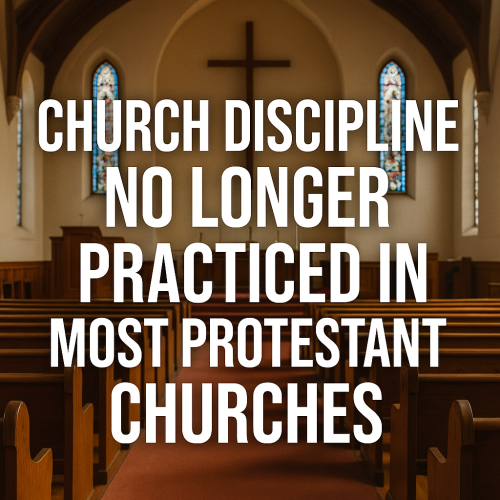Church Discipline No Longer Practiced in Most Protestant Churches, Lifeway Survey Reveals
A newly released survey from Lifeway Research has revealed a striking shift in modern Protestant church practice: formal church discipline, once a vital component of congregational life and biblical accountability, has largely disappeared from the majority of Protestant churches in the United States.
According to the survey of 1,000 U.S. Protestant pastors conducted in September 2024 and published in June 2025, only 18% of pastors say their church has exercised church discipline in the past year. More than a quarter (26%) say their church has never carried out any form of discipline. Even more concerning, 44% said it’s been at least three years since any church discipline was practiced in their congregation.
These findings point to what many see as a broader erosion of biblical standards within American Christianity. Once a hallmark of church life designed to protect holiness and promote repentance, church discipline has been replaced in many churches with a culture of permissiveness and fear of offense.
“Biblical church discipline is a command, not an option,” said Eric Thompson, a conservative Christian commentator. “The fact that most Protestant churches now ignore this responsibility shows just how compromised and worldly the church has become. Leaders are more concerned about filling pews than upholding righteousness.”
The Lifeway report notes that Southern Baptist pastors are the most likely to report practicing discipline recently, with 29% saying their church has done so in the last year. This compares to only 6% of Methodist pastors and 10% of Presbyterian/Reformed pastors.
Historically, church discipline has been a clear expectation laid out in Scripture. Matthew 18:15-17 outlines a step-by-step process for dealing with unrepentant sin in the church. The Apostle Paul likewise instructed the Corinthian church to remove a man who was openly engaging in sexual immorality, warning that “a little leaven leavens the whole lump” (1 Corinthians 5:6). Yet many modern pastors now appear reluctant to follow these biblical directives.
When asked why church discipline isn’t practiced more often, pastors cited various reasons, including fear of legal repercussions, lack of training, and concern over losing members. One in five pastors (20%) said discipline could cause division in the church, while others admitted it is simply too uncomfortable or unpopular in today’s therapeutic and consumer-driven church environment.
Thompson believes these excuses miss the point: “Christ didn’t command us to be liked. He called His church to be holy. Discipline isn’t about punishment—it’s about love and restoration. When we ignore unrepentant sin, we allow it to spread like cancer in the body of Christ.”
The data also reveal significant denominational and generational divides. Pastors over the age of 65 were far more likely to report practicing discipline than their younger counterparts. Similarly, churches that identify as evangelical were more likely to engage in church discipline than those classified as mainline.
A full 55% of pastors under the age of 44 said their churches had either never practiced discipline or had not done so in over three years. This generational divide underscores what many see as a crisis of courage in leadership, where modern pastors prioritize cultural relevance over scriptural obedience.
The cultural consequences of this decline in accountability are not lost on many observers. As American society continues to normalize sin and moral relativism, the church is expected to be a countercultural force, not a mirror of the world’s standards. However, the Lifeway data suggest that many churches have surrendered that calling.
A recent article from End Time Headlines warned that this trend reflects deeper spiritual decay. “The absence of discipline signals a loss of conviction. If the church won’t call sin what it is, then it has no power to call anyone to repentance or salvation,” the article stated.
Churches that do engage in discipline often face backlash, both internally and externally. Several high-profile cases in recent years have seen disciplined members sue churches or smear them on social media, deterring other pastors from following through with the process. Yet despite the risks, many theologians argue that biblical fidelity must outweigh fear of reprisal.
Dr. Jason Thacker of the Ethics and Religious Liberty Commission explained, “The church is not just a support group—it’s the body of Christ, called to reflect His holiness. Discipline, done rightly, is not about control but care. It’s about rescuing the wanderer.”
For conservative Christians like Thompson, the findings of this latest survey should serve as a wake-up call. “We need a return to courageous, Bible-believing leadership. We can’t keep soft-pedaling sin and expect revival. Church discipline isn’t optional—it’s obedience.”
With just 7% of pastors saying their church disciplined someone in the past six months, the practice appears to be on life support in many congregations. Whether the tide can be turned remains to be seen. But one thing is clear: the biblical model for church governance is being quietly abandoned, and the consequences for spiritual health may be severe.
As American churches navigate an increasingly hostile culture and declining biblical literacy, the choice before them is clear—stand firm in truth, or compromise into irrelevance. For many faithful believers, the time to restore church discipline is now, before the damage becomes irreversible.

